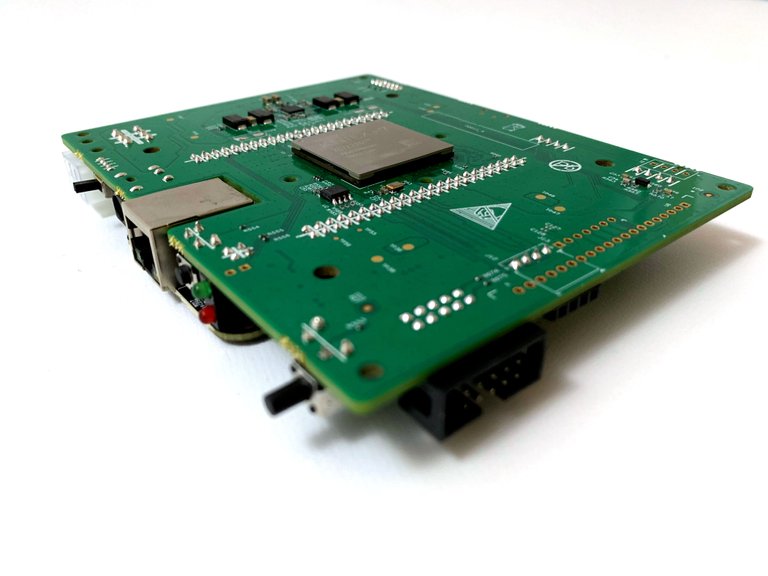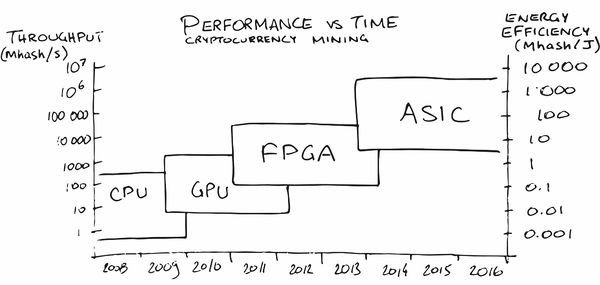It’s been more than a year since we switched from GPU mining to FPGA (Field Programmable Gate Array) mining. Why did we choose FPGA over other hardware? Why use FPGAs for cryptocurrency mining?

Why should I care about FPGAs?
Let’s start from the beginning; our crypto mining journey began with a bunch of GPUs mining coins such as Ethereum and Monero. Things were going well until the infamous early 2018 market crash. Everything went downhill and the whole GPU mining operation became unprofitable. At that moment, we had to opt for another solution.
On June 2018, we stumbled across the renowned whitefire990’s bitcointalk article. The claimed numbers were too good to be true and it would be a loss not to try them ourselves. Wanting to test them out without having to invest a lot of money, we proceeded to try FPGA mining via AWS (Amazon Web Services).
After successfully trying FPGA mining on AWS, it did prove a critical point.
The results were astonishing. After discovering that the VCU-1525 only consumes 80–90 Watts with 300Mhz clock speed, we quickly realized that there was an unfulfilled potential here. The FPGA mining card, VCU-1525, can run certain algorithms 6–20x faster than GPU while consuming the same amount of power!
Subsequently, we decided to jump on the FPGA mining train 🚂
In today’s market condition, FPGA can make roughly $12/day. — June 21, 2019
What is an FPGA?
FPGA stands for Field Programmable Gate Array, and you can think of FPGA as a bunch of LEGO bricks (yes, those building blocks). You can build almost anything with them and most importantly it is entirely up to you. In this case, the building blocks are digital circuits.
CPU is a digital circuit which has a general purpose of running multiple tasks/things, and we usually build software to run on the CPU. Unlike CPU, FPGA is a blank digital circuit. All you have to do is to design the digital circuit and the FPGA will behave accordingly. In other words, you have control over the hardware.
FPGA vs. GPU vs. ASIC
Let’s make an analogy!
This analogy is about efficiency when computing cryptographic algorithms.
Let’s say that you have a task of mowing the lawn and are looking for the most efficient tool to utilize.
First, let’s take a look at a GPU. GPU is a toolbox with a set of random tools such as a screwdriver, wrench, hammer, etc. Not all of the items inside are useful but luckily, the box consists of a few items such as scissors, machete, and hand-held grass cutter, which can be used for lawn mowing. It provides you with a lot of options, but they are not the most efficient.
Second, you have an FPGA. FPGA is a LEGO engineering kit. You can build a lawnmower with this kit, which takes more time and more effort to build. However, FPGA can finish the lawn mowing faster than GPU. Once you’ve finished with the lawn mowing, you can create another tool using this kit.
Last but not least, is an ASIC. ASIC is a lawnmower. Technically, it’s the best tool to mow the lawn. Fast and easy to use. However, there’s no other use for this tool besides lawn mowing. Hence, if you decide to do other gardening tasks such as watering plants, you will have to buy a new tool. In other words, you will need to buy a new ASIC to mine other coins.
Continuing the explanation above, let’s take a look at this table:

ASIC (Application Specific Integrated Circuit)
ASIC is designed to run a specific algorithm only, that’s why it can run very fast but can’t change the algorithm it runs. Even though they have a high price, a profitable ASIC is easy to use.
GPU (Graphics Processing Unit)
GPU has a primary purpose of graphics rendering. It can produce hashes faster compared to CPU, but still slower compared to FPGA and ASIC. GPU is adaptable as you can change its algorithms. They are also easy to get, user-friendly and the price is not very high compared to the rest of the options.
FPGA (Field Programmable Gate Array)
Similar to GPU, FPGA can also change algorithms which makes them adaptable. However, unlike GPU, you need to build both the digital circuit design and the software. It’s not user-friendly, as learning how to use it might take weeks to months and learning to even develop the FPGA might take months to years. FPGA used to be difficult to purchase, but now you can easily get one online. There are a lot of FPGA chips models and sizes out there, as they are ranged from cheap ($179) to expensive ($5750), which makes them more affordable.
Positioning
FPGA mining efficiency (hashing speed/power consumption) is very efficient, compared to GPU mining and drastically outperforms CPU mining. However, ASIC is still faster and more efficient than FPGA.

FPGA has several advantages; such as being faster than GPU and more flexible than ASIC, meaning FPGA can be very profitable mining coins that are ASIC-resistant. Therefore, FPGA shouldn’t compete with ASIC, but with GPU.
Conclusion
We decided to mine crypto using FPGAs because they yield better returns, due to it’s higher hash rates and flexibility in algorithms. Eventually, only lower-cost ASICs will survive as miners realize that they will never get a return on their investment (ROI). GPU, on the other hand, is competing with a device that can run 5–20x its speed, and soon enough they’ll be out of the game. Hence, this is why we chose to start our journey with FPGA Mining.
So, why don’t you switch to FPGA? Let us know! — FPGA.guide Team
Originally posted in Medium
Also posted at News FPGA Guide
Learn more: fpga.guide
Join Us on Telegram
Contact us: [email protected]

Hi! I am a robot. I just upvoted you! I found similar content that readers might be interested in:
https://medium.com/fpga-guide/cryptocurrency-mining-why-use-fpga-for-mining-fpga-vs-gpu-vs-asic-explained-5aaa400082b9
Hey robot! That's ours, Thank You!
Thanks for sharing.
Posted using Partiko Android
You're welcome :)
which FPGA rig you recommend for a beginner?
Hello, it is either to buy blackminer F1 Mini, but if you want to try bigger investment we're currently have a refurbished BTU9P , it is a good board that can mine the upcoming X16R Algo :)
We have a very guide here to start FPGA Mining : https://fpga.guide/en/guides/ (it is very practical and easy to follow)
You can hit us up to ask more question on telegram or email, we'll be happy to help you.